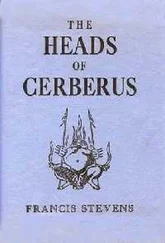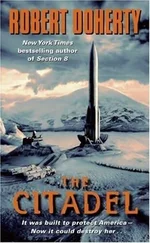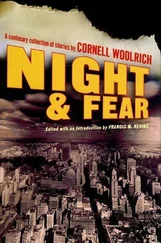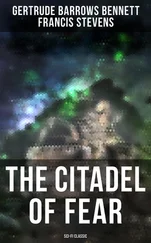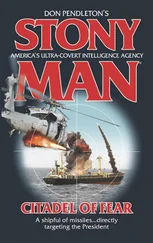Francis Stevens - Citadel of Fear
Здесь есть возможность читать онлайн «Francis Stevens - Citadel of Fear» весь текст электронной книги совершенно бесплатно (целиком полную версию без сокращений). В некоторых случаях можно слушать аудио, скачать через торрент в формате fb2 и присутствует краткое содержание. Жанр: Фантастика и фэнтези, Прочие приключения, на английском языке. Описание произведения, (предисловие) а так же отзывы посетителей доступны на портале библиотеки ЛибКат.
- Название:Citadel of Fear
- Автор:
- Жанр:
- Год:неизвестен
- ISBN:нет данных
- Рейтинг книги:5 / 5. Голосов: 1
-
Избранное:Добавить в избранное
- Отзывы:
-
Ваша оценка:
- 100
- 1
- 2
- 3
- 4
- 5
Citadel of Fear: краткое содержание, описание и аннотация
Предлагаем к чтению аннотацию, описание, краткое содержание или предисловие (зависит от того, что написал сам автор книги «Citadel of Fear»). Если вы не нашли необходимую информацию о книге — напишите в комментариях, мы постараемся отыскать её.
Citadel of Fear — читать онлайн бесплатно полную книгу (весь текст) целиком
Ниже представлен текст книги, разбитый по страницам. Система сохранения места последней прочитанной страницы, позволяет с удобством читать онлайн бесплатно книгу «Citadel of Fear», без необходимости каждый раз заново искать на чём Вы остановились. Поставьте закладку, и сможете в любой момент перейти на страницу, на которой закончили чтение.
Интервал:
Закладка:
O'HARA stood on the macadamized drive beneath the same tree from which Genghis Khan had reached for his throat two nights ago. MacClellan alone was with him, for at the last moment Rhodes had received a telephone call from his partner-that line was in working order, after all-begging that he come in town at once on a matter of considerable business importance.
O'Hara urged him to go, and in the end he did, but with a promise to join them later if possible. So they had run down to the city in Rhodes' car, dropped its owner at his office, set Forester down at city hall-his superior having denied any need of the young man loafing away any more time on this job-and proceeded straight to Carpentier.
O'Hara was his own chauffeur, and he had MacClellan in the tonneau, so at least he was spared any converse with him during the trip. Once at the bungalow, however, the detective gave his tongue and his opinions a loose rein.
As he had told them, this fresh bit of apparently objectless destruction bore a broad resemblance to the earlier attempt, save that this time its perpetrators had left no visible trace of themselves save their work.
Every room in the house had been visited, as if by a small invading whirlwind. An indiscriminating whirlwind, too, that had scattered and smashed with no regard for relative values.
A finely carved and heavily constructed sideboard which had escaped the first visitation had been broken to bits in the most difficult and painstaking manner. But equally the cheap deal table, at which Colin had taken supper the night before, lay about the kitchen in well-nigh unidentifiable fragments. In the bedroom that had been first Cliona's and then Colin's, nothing had been touched except the bed, and that was irrevocably smashed, even to the twisted mass of wire which had been the springs.
So everywhere things common and valuable were broken or left intact with the whimsicality of choice that distinguishes those three insentient destroyers-fire, storm, and concussion.
Yet there were no signs of an explosion, no fire had raged here, and, though a storm there had been, it must have been a strange one to have shattered windows and doors, ravaged inner rooms, and left roof and walls uninjured.
The milkman's statement that he "came up to leave the milk and found no place to leave it" was not entirely unfounded. His custom had been to put O'Hara's quart bottle of the healthful fluid on the front steps, but these steps, which were wooden, had been torn away and lay some distance off. Every one of the veranda windows was broken, sash and all, and the door was flat and in two pieces.
Having gloomily inspected the remains of his premises, Colin stood in the dining-room and listened with acute boredom to MacClellan's views. Something small and bright-colored caught his eye, and stooping, he plucked it from amidst the sideboard's debris . It was the last surviving remnant of that unfortunate Aztec godling-the head, minus its miter, and part of the red and blue tunic.
Colin stared grimly down at the still patiently smiling face.
"So they got you at last, little man," he muttered, half-abstractedly.
The face smiled on-patient forever with the blindness of mankind.
"What's that?" demanded MacClellan.
"Nothing." Colin tossed the fragment aside, and led the way toward the door. "Just a bit of pottery that was worth a few thousand before we began receiving midnight callers. There's no luck to this house-no luck all. I shall live here no more. Drop the case or keep on with it as you like-its a matter of no further interest to myself."
This annoyed MacClellan. It annoyed him more than O'Hara's insistence that he solve the previous case. There could be drawn an inference that the Irishman had lost all faith in his ability to solve anything whatever, but in that he was mistaken. O'Hara could not lose what he had never possessed.
"We shall continue to investigate," he declared with stolid dignity. "We have sent word down the line to round up every hobo between here and headquarters, and — "
"Hoboes!" The ejaculation had a quality of bitter scorn that dissipated the last of MacClellan's patience.
"Yes, hoboes!" he snapped. "If you're so sure that I don't know anything, then you have some good reason for being sure! When you get ready to tell it, let me know. I'm going back by train. Good day!"
Colin viewed his retreating figure with wide, amused eyes.
"And that's the only really clever thing he ever said in his life! Good day to you, Mr. MacClellan! Sure, I'll let you know-but not until I'm ready!"
The detective, on his early morning visit, had again called out a patrolman to stand guard over O'Hara's possessions, and there he stood, MacClellan having departed in too great a rage to remember his patient sentinel.
"Go or stay as you please," said O'Hara to the officer. "I'll send up a man presently to pack what's left worth packing and ship it in town. I doubt if I'll return here myself."
"I'll see that your man makes a good job," volunteered the policeman agreeably. O'Hara had just slipped a bit of green paper into his willing hand-extended for that purpose, perhaps from habit, discreetly and with back half turned.
"Thanks. I wish you would."
As Colin climbed into the driving seat of his borrowed car he gave a last glance about the now desolate hilltop. Here and there strayed some idle and amateur seeker of "clues." A reporter or so, ruthlessly repelled by the gloom-stricken Irishman, still hovered hungrily in the offing. One individual hurried toward him as he started the car. Had Colin looked he would have seen a lean, worn-looking man, white-haired, with the mark of an old scar across his lower forehead.
"Mr. O'Hara!" he called. "Hey, there! O'Hara! Wait a minute!"
"Go to the devil with the rest of 'em!" muttered Colin without even a glance, and fairly shot out of hearing.
He wanted to get away from it all. He had by no means surrendered hope of achieving a final solution-in fact he was grimly certain that the solution would not be much longer delayed. But he was sick of the bungalow-sick of everything.
No matter if he exposed Reed as the deus ex machina of these lawless manifestations; no matter if in exposing him he discovered the reason of Reed's grudge, if he had one. No matter, even, if for one reason or another the killing of Marco should be publicly applauded as a righteous act-though that last seemed to him unlikely enough. No matter for anything. Was he not indeed linked by a "golden thread" to the one girl in the world for him-and was she not hopelessly, unquestionably insane?
He determined that he would not go back to Green Gables. She was safe in his sister's keeping, and he determined that before yielding himself to the police he would have one final interview with Reed-providing that is, that he could easily locate him.
Yet before going on that errand, he brought the car to a halt before Bradshaw's shop, entered and with a nod to the storekeeper made for the little telephone booth. But Bradshaw halted him.
"Say, Mr. O'Hara, your sister called up a while ago. Said the bungalow line was out of order. Did you find out — "
"Did Mrs. Rhodes want me, then? How long ago was that?"
"Oh, about an hour, more or less, the first time. She's called twice since and says for you to phone her right away. Did that detective fellow — "
"Why didn't you send up the hill after me?" demanded O'Hara indignantly.
"Nobody to send. Been looking around for a boy, but they're all up round your place, I guess. Did you find out — "
"I did not! " O'Hara disappeared in the booth, banging the door in poor Bradshaw's aggrieved face. That is, he tried to bang it, but the booth never having been built for his bulk, the attempt was a miserable failure.
Читать дальшеИнтервал:
Закладка:
Похожие книги на «Citadel of Fear»
Представляем Вашему вниманию похожие книги на «Citadel of Fear» списком для выбора. Мы отобрали схожую по названию и смыслу литературу в надежде предоставить читателям больше вариантов отыскать новые, интересные, ещё непрочитанные произведения.
Обсуждение, отзывы о книге «Citadel of Fear» и просто собственные мнения читателей. Оставьте ваши комментарии, напишите, что Вы думаете о произведении, его смысле или главных героях. Укажите что конкретно понравилось, а что нет, и почему Вы так считаете.



